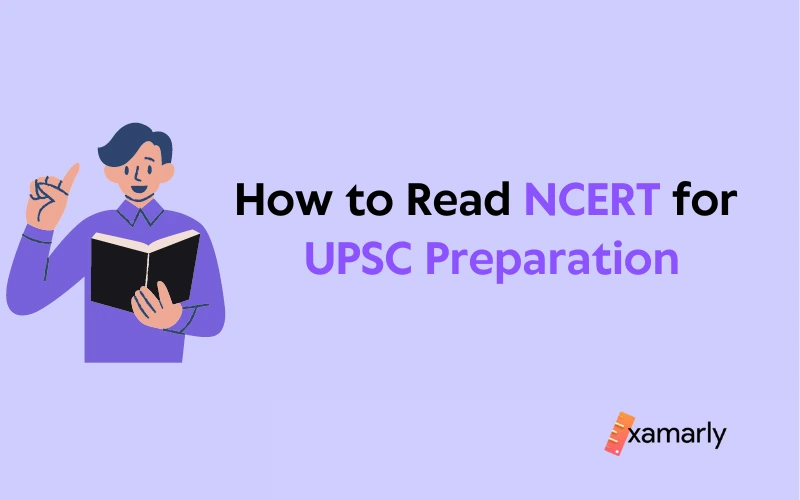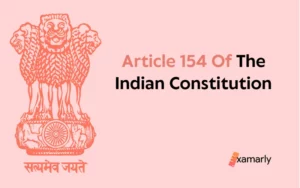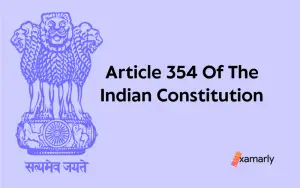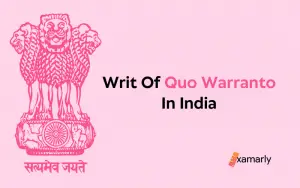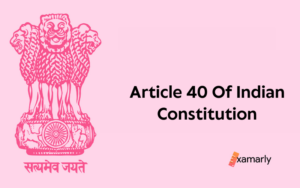The Union Public Service Commission (UPSC) is the premier recruitment body in India and the most sought-after career destination for millions of aspiring civil servants. Clearing the UPSC exam requires a lot of hard work, dedication, and a systematic approach to studying.
One of the key aspects of preparing for the UPSC exam is reading, which forms the backbone of the entire preparation process.
In this blog, we will be discussing various strategies and tips on how to read NCERT for UPSC, so that you can optimize your study time and maximize your chances of success.
This blog will provide you with valuable insights and guidance on how to read for UPSC in an efficient and effective manner.
- Why are NCERT Books Needed for UPSC Preparation?
- How to Read NCERT for UPSC
- List of Must-Read Books from NCERT for UPSC Exam
- Tips for Efficient Reading of NCERT for UPSC Preparation
- Strategy for Reading NCERT Books for UPSC
- Conclusion
- FAQs related to How to read NCERT for UPSC Preparation
- What is NCERT and why is it important for UPSC preparation?
- Which NCERT books should I read for UPSC preparation?
- Should I only read NCERT books or should I also read other reference books?
- How much time should I dedicate to reading NCERT books for UPSC preparation?
- How often should I revise the NCERT books for UPSC preparation?
- Is it necessary to read all NCERT books cover to cover for UPSC preparation?
- Can I skip certain chapters in NCERT books while preparing for UPSC?
- Can reading NCERT books alone help me clear the UPSC exams?
Why are NCERT Books Needed for UPSC Preparation?
Reading NCERT books is an essential aspect of preparing for the UPSC exams. The NCERT (National Council of Educational Research and Training) is the main textbook publisher for primary and secondary schools in India and it provides comprehensive and in-depth coverage of various subjects that are a part of the UPSC syllabus.
Here are some of the reasons why reading NCERT books are important for UPSC preparation:
- Comprehensive Coverage of UPSC Syllabus: It provides a comprehensive and in-depth coverage of the UPSC syllabus, making it a valuable resource for acquiring the necessary knowledge and understanding of the subjects.
- Foundation for UPSC Preparation: These books provide the foundation for UPSC preparation and help build a strong base for the exams.
- Easy to Understand: It is written in simple and concise language, making it easy for students to understand and retain the information.
- Emphasis on Concepts: These books place a strong emphasis on concepts, which helps students to understand the underlying principles and retain the information for a longer period.
- Updated and Accurate Information: They are updated regularly to include the latest information and are reviewed by experts to ensure accuracy.
- Affordable and Accessible: These are affordable and widely available, making them accessible to all students preparing for the UPSC exams.
In conclusion, reading NCERT books is a crucial part of UPSC preparation and it helps students to acquire a comprehensive understanding of the subjects, build a strong foundation, and retain the information for a longer period.
Related Article: UPSC Exam Pattern
How to Read NCERT for UPSC
NCERT books have been devised to help learners comprehend concepts at an extremely deep level. These textbooks are free to download from their official website, making them even more attractive as a study material option when preparing for your UPSC examinations.
Here are some tips that will make you understand how to read NCERT for UPSC and hence will help you to cover all of the books for the UPSC Prelims:
The Do’s:
- Make a timetable: Keeping oneself motivated is a herculean task especially when there is a lot to study and there isn’t that much time left for the exam. Make a subject-wise list that will ascertain you cover all topics in the syllabus.
- Make brief notes: Notes are lifesavers for last-minute revision. Making comprehensive notes carefully will help to revise everything with less effort and in minimum time.
- Revision: Before wrapping up for the day it is ideal to revise whatever you have learned. Even 20 to 25 minutes of your time can ensure an effective outcome.
- Mocks: Mock tests show your everyday progress and from them, you can keep a track of yourself. Make sure to go through your weak portions thoroughly. Try to attempt a minimum of one mock test every day.
Follow the(Approach, Priority & Time) Formula:
1. The Approach: Starting with the right approach does matter a lot. There can be two ways to study from these books :
- Class wise
- Subject wise
The class-wise approach is used to cover all the books of a particular class starting from class 6th up to class 12th. This could be useful when there is a time constraint.
The subject-wise approach helps you to read the complete set of books by choosing one particular subject at a time and covering the books related to that subject starting from class 6th.
However, through this approach, you can understand all the concepts clearly and also remember the concept for a longer time.
2. Prioritization: The syllabus of UPSC is vast. Therefore, you have to prioritize
different subjects. There are various subjects covered in these books like Sociology, Geography, History, and Science.
Choose a subject in which you feel you are weak and need proper preparation. Start preparing for it in the first place. This will give you a lot of extra time to review yourself and revise the toughest part before the exam.
3. Time management: To achieve the desired results, you need to remember a simple thing. If you are running out of time then time management becomes a key factor for any exam.
You Might Also Like: UPSC Preparation Tips From Toppers: 10 Effective Tips
List of Must-Read Books from NCERT for UPSC Exam
As we discussed earlier, books from classes 6th to 12th are extremely important to cover a large amount of the entire syllabus of the UPSC Civil Services Examination. We have also mentioned essential and relevant topics/chapters of some books.
To download PDFs of books from the NCERT website click here.
Read on to know the must-read list of books from NCERT for UPSC CSE.
History
- Class 12:Themes in Indian History-I, Themes in Indian History-II, Themes in Indian History-III
- Class 11: Themes in World History
- Class 10: India and the Contemporary World-II
- Class 9: India and the Contemporary World-I
- Class 8: Our Pasts-III
- Class 7: Our Pasts-II
- Class 6: Our Pasts I
Geography
- Class 6: The Earth: Our Habitat
- Class 7: Our Environment
- Class 8: Resources & Development
- Class 9: Contemporary India I
- Class 10: Contemporary India II
- Class 11: Fundamentals of Physical Geography, India: Physical Environment
- Class 12: Fundamentals of Human Geography, India: People & Economy
Economics
- Class 9: Economics
- Class 10: Understanding Economic Development
- Class 11: Indian Economic Development
- Class 12: Introductory Microeconomics, Supplementary reading material in Economics – Introductory Macroeconomics
Political Science
- Class 9: Democratic Politics I
- Class 10: Democratic Politics II – Class 10
- Class 11: Indian Constitution at Work, Political Theory – Class 11
- Class 12: Contemporary World Politics (Chapter 8 – Environment & Natural Resources), Politics in India Since Independence
Sociology
- Class 11: Introducing Sociology – Class 11
- Class 12: Social Change & Development in India, Indian Society Textbook
Art and Culture
- Class 11: An Introduction to Indian Art
- Class 11: Living Craft Traditions of India (Chapters 9 & 10)
- Class 12: Craft Traditions of India
Science Books
- Class 6: Chapter 9 – The Living Organisms & their Surroundings
- Class 7: Chapter 7 – Weather, Climate & Adaptations of Animals, Chapter 9 – Soil
- Class 8: Chapter 1 – Crop Production & Management, Chapter 5 – Coal & Petroleum, Chapter 7- Conservation of Plants & Animals, Chapter 12 – Friction, Chapter 18 – Pollution of Air & Water
- Class 9: Chapter 14 – Natural Resources
- Class 10: Chapter 14 – Sources of Energy, Chapter 15 – Our Environment, Chapter 16 – Management of Natural Resources
- Class 11: Biology
- Class 12: Biology – Unit X: Ecology ( Chapter 13 – Organisms & Population, Chapter 14 – Ecosystem, Chapter 15 – Biodiversity & Conservation, Chapter 16 – Environmental Issues)
Tips for Efficient Reading of NCERT for UPSC Preparation
- Set achievable goals for each reading session and stick to them.
- Start by going through the syllabus and identifying the important topics in each subject.
- Have a notebook and pen to jot down important points and take notes.
- Focus on understanding the concepts and not just memorizing the facts.
- Highlight the important points and revise regularly.
- Make use of visual aids such as maps, diagrams, and illustrations.
- Test your understanding through regular quizzes and mock tests. Practice questions and mock tests to assess your understanding and identify areas of improvement.
Strategy for Reading NCERT Books for UPSC
It is important to study NCERT-published books for UPSC civil service examination as it forms the basis for most subjects covered in the exam.
The best thing about these books is that it provides content in a simple format with lots of pointers and tables. This makes it easier for us to understand the content and well as to memorize the facts efficiently.
But you must ensure that your process of reading is efficient. Highlight as you read so that it is easier to revise later. Also, it is best that you read these textbooks a minimum of three times.
As much as possible, divide the books by syllabus topics to ensure that you cover all the topics in a short amount of time.
You can finish the entire book in three to four months, although it may take you 4.5 months to finish them all. But if you’re a slow reader, you can easily memorize the topics of these books within one to two months.
As long as you have the right schedule and the time dedicated to reading, these books will provide you with a solid foundation from which you can build on other topic-relevant books.
The first way to read NCERT-published books for the UPSC-conducted civil service examination is to go subject-wise. This way, you’ll read all these books, class by class.
You’ll find it easier to understand each subject if you read them subject-by-subtopic. Besides, this method will also help you retain information longer.
Moreover, reading NCERT books in a subject-wise manner will make you familiar with the subject content.
Check Out Our Blog: Want To Decode “Is UPSC Exam Tough”? Consider 7 Deciding Factors
Conclusion
In conclusion, reading NCERT books is an essential part of preparing for the UPSC exams. These books provide comprehensive coverage of the UPSC syllabus and are a valuable resource for acquiring in-depth knowledge of the subjects.
To make the most of your time and efforts, it is important to approach NCERT reading with a systematic and consistent approach, set achievable goals, take notes, and regularly assess your understanding through quizzes and mock tests. With these tips, you can effectively use these books to prepare for the UPSC exams and achieve success.
FAQs related to How to read NCERT for UPSC Preparation
What is NCERT and why is it important for UPSC preparation?
NCERT stands for National Council of Educational Research and Training and it is the main textbook publisher for primary and secondary schools in India.
It provides comprehensive and in-depth coverage of various subjects which are a part of the UPSC syllabus, making it an essential resource for UPSC preparation.
Which NCERT books should I read for UPSC preparation?
For UPSC preparation, you should focus on the NCERT books of classes 6th to 12th in the following subjects: History, Geography, Political Science, Economics, and Science & Technology.
Should I only read NCERT books or should I also read other reference books?
While these books provide comprehensive coverage of the UPSC syllabus, it is also recommended to read other reference books and study materials to get a better understanding of the topics and to have a wider perspective.
How much time should I dedicate to reading NCERT books for UPSC preparation?
The amount of time you dedicate to reading NCERT books will depend on your individual pace and the amount of time you have for preparation. However, it is important to have a systematic and consistent approach to reading to make the most of your time.
How often should I revise the NCERT books for UPSC preparation?
It is recommended to revise at least once before the exams, and once every few months to keep the information fresh in your mind.
Is it necessary to read all NCERT books cover to cover for UPSC preparation?
While it is recommended to read all NCERT books cover to cover, it may not be necessary for everyone. It is important to focus on the topics that are most relevant to the UPSC syllabus and to make the best use of your time.
Can I skip certain chapters in NCERT books while preparing for UPSC?
Yes, you can skip certain chapters if you feel that they are not relevant to the UPSC syllabus. However, it is important to have a thorough understanding of all the important topics covered in the syllabus.
Can reading NCERT books alone help me clear the UPSC exams?
Reading NCERT books is a crucial part of UPSC preparation, but it is not the only resource you should rely on. You should also practice mock tests, read other reference books, and stay updated on current events to have a comprehensive understanding of the UPSC syllabus.


